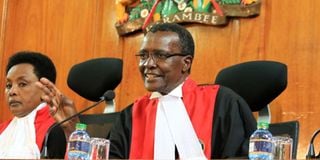Premium
Maraga faulted for handing over functions to DCJ Mwilu

Chief Justice David Maraga (right) and his deputy Philomena Mwilu at the Supreme Court on November 14, 2017.
What you need to know:
- Some constitutional experts have argued that under Kenyan law, when a Chief Justice retires, his or her deputy can only take over some functions of the office.
- With retired judge Jackton Ojwang yet to be replaced and Justice Maraga on leave pending retirement, there would only be four other judges applicable for hearing of the suit.
Chief Justice David Maraga’s decision to transfer all his functions to his deputy Philomena Mwilu has drawn fresh controversy as some advocates argue that the move is unconstitutional.
Some constitutional experts have argued that under Kenyan law, when a Chief Justice retires, his or her deputy can only take over some functions of the office.
Justice Maraga last Thursday wrote to DCJ Mwilu stating that he has transferred all his powers to her until a substantive CJ is appointed. The retiring CJ cited articles 161 and 163 of the Constitution in his directive.
Article 161 establishes the office of the DCJ, while article 163 gives power to the Supreme Court and defines its members, including the Chief Justice and his deputy.
Some constitutional lawyers now argue that the Constitution and Judicial Service Act only allow the DCJ to fill in for the CJ in some capacities, but that there are functions reserved for the substantive holder of the office.
Mr Victor Olao, an advocate with experience in constitutional matters, argues that the wording of Justice Maraga’s letter is irrelevant as the law spells out the duties that his deputy can and cannot take on prior to the appointment of a substantive CJ.
Court cases
Some of the functions that are reserved exclusively for a substantive CJ include admitting of advocates to the High Court bar, transfer of judges, advising the President to dissolve Parliament and issuance of guidelines on how court cases will be conducted.
“There are certain roles that cannot be delegated no matter what the wording of the letter is. The letter and spirit of the law do not contemplate that certain functions can be delegated. The handing over is purely administrative. She (DCJ Mwilu) cannot make substantive decisions as it is,” Mr Olao said.
He added that the four petitions for removal against DCJ Mwilu before the Judicial Service Commission (JSC) also complicate matters because they narrow down her scope and could lead to a lack of quorum at the Supreme Court in some cases.
If, for instance the case DCJ Mwilu has filed against the JSC to stop hearing of the removal petitions was to end up at the Supreme Court, she would be unable to preside over the matter.
With retired judge Jackton Ojwang yet to be replaced and Justice Maraga on leave pending retirement, there would only be four other judges applicable for hearing of the suit. But the Constitution holds that at least five Supreme Court judges must sit for any given case; hence there would be a crisis. Mr Suyinka Lempaa, a constitutional lawyer, believes that Justice Maraga’s letter to DCJ Mwilu is unconstitutional as it purports to give Justice Mwilu some powers reserved for the CJ.
“The letter is unconstitutional and illegal in so far as the law is concerned. The letter would be okay if he (Justice Maraga) only restated what the law says. But if he is going beyond the red letter of the law, it is not okay. That office cannot be filled in with by the feelings of the departing office holder,” Mr Lempaa said.
Maraga succession
Mr Ekuru Aukot, a lawyer and former member of the Committee of Experts that birthed the 2010 Constitution, however, argues that Justice Maraga is in order by donating all Chief Justice’s powers to his deputy.
Dr Aukot said the principles of necessitation and purposive interpretation of the law should be used in instances such as the Maraga succession. Under the principle of necessity, unconventional decisions can be made to avoid a more drastic situation. Purposive interpretation of the law involves translating the intentions of a specific law where no specific action has been defined.
“We cannot allow a vacuum to exist. We are talking about the institution of the Chief Justice, the office itself and not individuals. The office has to function as it is ordinarily expected. And that is why I think he (Justice Maraga) is right in asking her (DCJ Mwilu) to assume all functions of the CJ,” Dr Aukot said.
Mr Maraga in his letter indicated that he will return to office on January 11 to formally hand over to DCJ Mwilu pending appointment of a new CJ.
Kenyans will have to wait longer for the appointment of Justice Maraga’s replacement as internal wrangles marred plans to start the search for a new CJ. JSC initially met in September to plan the recruitment process. In a follow-up meeting in October, justices Maraga, Mwilu and Mohammed Warsame opposed plans to start recruitment before Mr Maraga retires on January 12, 2021.
Justice Maraga adjourned the October meeting to enable members of the JSC to reach a consensus on the recruitment plans.
But insiders have now confirmed to the Nation that no deal was reached and that the search for a new CJ will likely start mid-January after Mr Maraga has officially retired.
The Constitution only directs the JSC on how the process shall be done, but does not say when the process should start.





